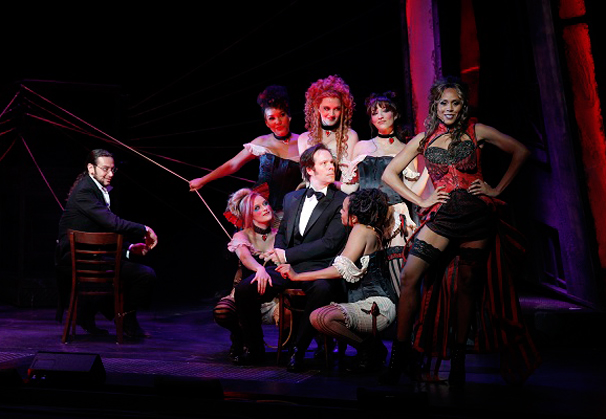
A battle between good and evil rages on stage at the Marquis Theater in more ways than one in the revival production of Frank Wildhorn’s musical “Jekyll and Hyde.” With a cast led by former “American Idol” contestant Constantine Maroulis and Grammy nominee Deborah Cox, director Jeff Calhoun’s show contains some genuinely impressive moments. But overall, as the story also goes, the good isn’t quite good enough to triumph in the end.
This musical adaptation of the classic story tells of Dr. Jekyll, a scientist convinced he has created a potion that will eliminate the evil aspects of human nature. Unable to find a volunteer to test the substance on, he takes it himself to deleterious effect. His potion causes the opposite of the intended effect and instead heightens the evil within him to the point of creating a sinister alter ego known as Mr. Hyde.
Cox takes on the role of the tragic heroine Lucy Harris, a prostitute who encounters the mercy of Jekyll, the abuse of Hyde and the affection of both. From her first number “Bring on the Men,” Cox’s characteristically strong vocals display great promise, and the subtle sadness with which she takes on the deceptively playful lyrics suggest that the pop star may actually turn out to have the acting chops for the role.
Unfortunately, Cox proves unable to sustain her emotional depth through the second act, when Teal Wicks (“Wicked”), as Jekyll’s fiancée Emma, easily outshines her during their duet, “In His Eyes.”
Maroulis, though ultimately miscast, does a fair job in his embodiment of the kind, obsessive Dr. Jekyll. His rendition of “This is the Moment” is charged in a way that suggests the madness showcased by his alter ego’s persona is already present, and simply needed a push. When Mr. Hyde is unleashed — along with the actor’s ponytail, to signify the change — Maroulis is slightly less convincing, approaching the character in a way that recalls a little too closely his turn in Broadway’s “Rock of Ages.”
The climactic number, “The Confrontation,” in which the actor playing Jekyll and Hyde sings a duet with himself in the musical manifestation of internal conflict, has long proved problematic. While previous productions featured Robert Cuccioli and David Hasselhoff flinging their own locks back and forth over their faces in an effort to portray the duality, Calhoun chose to prerecord Hyde’s part and have a projection of the character sing it, while Maroulis in flesh tackled only Jekyll’s part.
Projections are featured heavily throughout the show and, combined with the loudly revamped score, have forced the show into a rock musical, a genre that feels completely out of place with the Victorian setting. The gimmicks create a disconnect for the audience that is even more unpleasant than the one experienced by the title character.
“Jekyll and Hyde” is playing now at the Marquis Theater at 1535 Broadway.
A version of this article appeared in the Tuesday, April 23 print edition. Olivia George is theater and books editor. Email her at [email protected].











































































































































